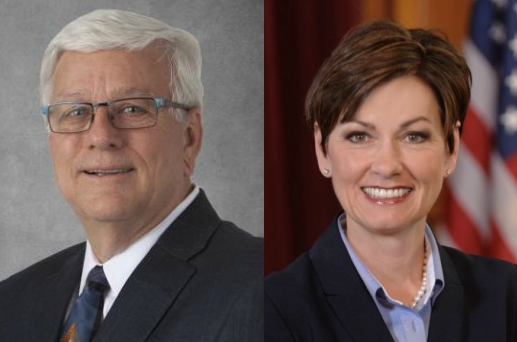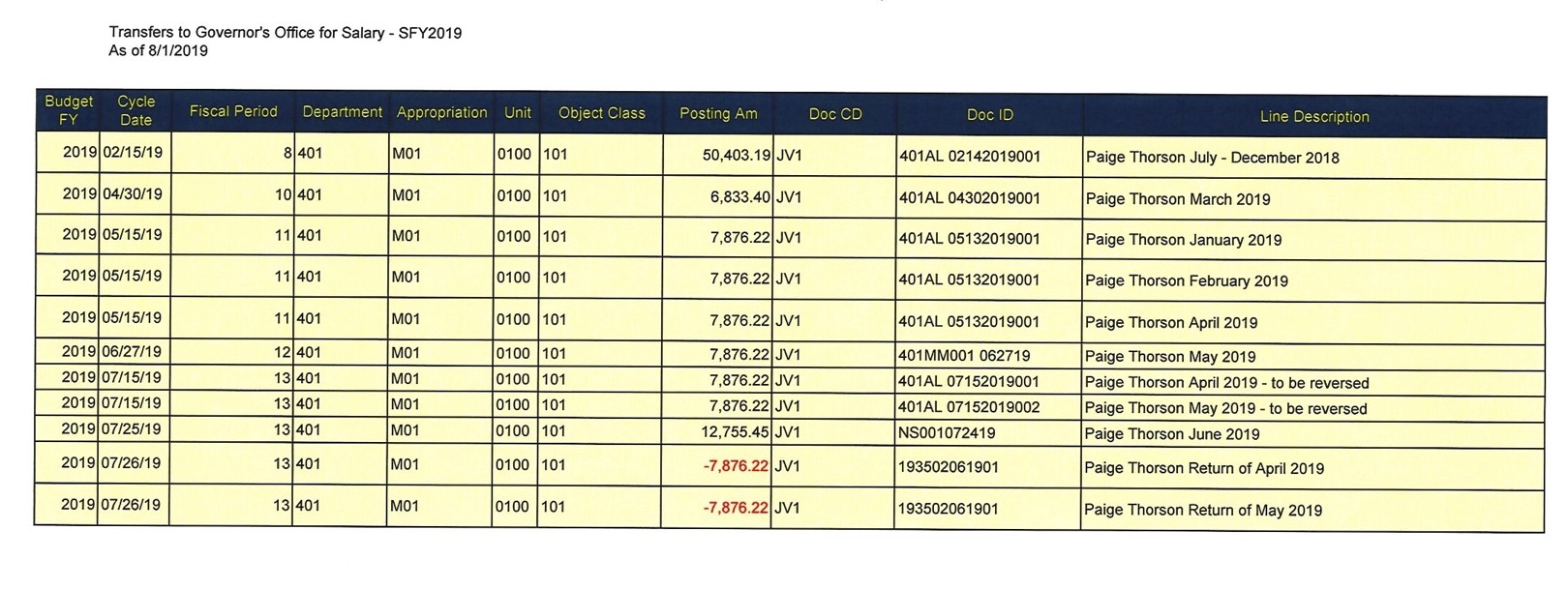Jerry Foxhoven has shed more light on the disagreement that preceded his forced departure as Iowa Department of Human Services director last month. On July 24 he told David Pitt of the Associated Press “that he declined to approve paying the salary of Elizabeth Matney, who left DHS on May 17 to accept a job as Gov. Kim Reynolds’ adviser on health policy.”
Staff for Reynolds disputed Foxhoven’s account, saying he never raised concerns about covering Matney’s salary and wasn’t fired for that reason. They also noted that for many years, state agencies including DHS have occasionally paid employees working in the governor’s office.
Foxhoven’s aware of that precedent, having signed some of the relevant documents himself. So why would he question the legality of this arrangement? The former director’s comments to reporters and records obtained by Bleeding Heartland provide some clues.
FOXHOVEN’S NEW CLAIMS
When Pitt asked if Foxhoven “objected to paying Matney out of his department’s funds, Foxhoven replied: ‘Yes, that’s what they got their own appropriation for.'”
He was referring to the fact that the governor’s office asked for and received an extra $200,000 for the fiscal year beginning July 1. Staff told state lawmakers Reynolds needed additional money to support new analysts on health and tax policy.
In texts to Pitt and other journalists on July 24, Foxhoven elaborated on the dispute he described in vague terms to a music journalist last week.
“I can confirm that I was concerned about the legality of using DHS funds to pay the salaries of the governor’s staff. I wanted an opinion about the legality of this from the attorney general’s office before I would act on the governor’s office request. I was asked to step down before I could ask for that legal opinion.”
Under a memorandum of understanding signed by DHS interim Director Gerd Clabaugh on June 19–two days after Foxhoven was shown the door–the department covered 100 percent of Matney’s salary from May 17 through June 30, the end of the 2019 fiscal year. Reynolds’ communications director Pat Garrett told Pitt that Matney “is now being paid from the governor’s office budget.”
In communication with the Des Moines Register on July 24, Garrett “said Foxhoven never was presented with the salary memo, and never raised a concern about such pay arrangements,” adding that Reynolds didn’t have this issue in mind when she asked Foxhoven to resign.
Reynolds and her staff have repeatedly declined to give any specifics on why the governor forced out the director, saying only that “a lot of factors” influenced her decision to go in a “new direction” for the agency.
PRECEDENTS FOR AGENCIES COVERING SALARIES IN THE GOVERNOR’S OFFICE
Earlier this week, I filed an open records request for documents related to DHS salary payments for Matney, Paige Thorson (Reynolds’ deputy chief of staff and previous health policy adviser), and Michael Bousselot, who worked in Governor Terry Branstad’s office. The DHS provided the records on July 25.
The first document is the memo mentioned above, requiring DHS to pay Matney’s full compensation from May 17 through June 30.
The second and third documents, signed by Foxhoven in 2018, oblige DHS to pay 69 percent of Thorson’s compensation from December 26, 2017 through June 30, 2018, as well as 69 percent of her salary and benefits for the entire 2019 fiscal year.
The fourth and fifth documents put DHS on the hook for 41 percent of Bousselot’s salary from October 1, 2013 through the end of the 2014 fiscal year, and for the entire 2015 fiscal year. Bousselot was Branstad’s legal counsel at that time.
Such arrangements are nothing new. Jon Neiderbach told Bleeding Heartland on July 10 that he remained on the DHS payroll during a six-month stint on Governor Tom Vilsack’s state government Redesign Research Team, and when he worked in the Rebuild Iowa Office during Governor Chet Culver’s tenure.
Reynolds’ staff gave journalists other current examples of salary-sharing agreements. Speaking on behalf of the Iowa Attorney General’s office, Lynn Hicks described the practice as common and legal.
The governor’s leading attack dog David Kochel trumpeted yesterday’s news as proof Foxhoven was pushing a “false narrative.” “He claims these salary arrangements were inappropriate, and yet had signed them previously in 2018 without objection,” Kochel scoffed.
What factors might have raised red flags for the DHS director?
SPENDING FEDERAL FUNDS ON THE GOVERNOR’S STAFF?
The Cedar Rapids Gazette’s Michaela Ramm was first to report, and Foxhoven has since confirmed to other journalists, that he spoke to the Office of Inspector General for the U.S. Department of Health and Human Services.
Presumably federal officials would have no interest in the Iowa governor’s personnel moves, unless federal funding or terms of a federal contract were potentially affected. Before moving over to Reynolds’ staff, Matney had led the Iowa Medicaid Bureau of Managed Care within DHS since 2015. The Health and Human Services Department oversees and provides much of the funding for the Medicaid program.
In a message on July 22, Neiderbach recalled, “They might have had to juggle money inside the DHS budget if any of my position was federally funded with restrictions…but I’m not aware that took place in either circumstance.”
For now, Foxhoven isn’t answering follow-up questions, so we can only guess what he brought to the Office of Inspector General’s attention.
Referring to accounts that the former director plans to meet with State Auditor Rob Sand, Kochel tweeted, “Why is Foxhoven asking @RobSandIA to look at this? The appropriate elected official to review is the Attorney General’s office, and they are quoted in the story.”
The Attorney General’s office can speak broadly about the legality of salary-sharing agreements. If Foxhoven had concerns about potentially improper disbursements to one or two people, that would be in the state auditor’s jurisdiction.
SPENDING DHS FUNDS ON A STAFFER NOT WORKING ON HEALTH POLICY?
Tony Leys and Stephen Gruber-Miller reported for the Des Moines Register on July 24,
Salary-sharing agreements signed under Branstad and Reynolds say the affected employees would provide “strategic support” to the agencies helping foot their salaries, the documents show.
“The governor’s staff are heavily involved in the day-to-day operations of our state agencies to improve coordination, communication, and execution of shared goals to better serve Iowans,” Garrett wrote in an email to the Register.
Gary Dickey was partly paid by another agency when he worked in the Vilsack administration and told Pitt,
“As long as work is being performed on behalf of the agency that’s paying the salary I don’t see a problem with it,” he said. “I understand concerns about lack of transparency. You could make an argument that it’s more transparent since you’re tying the cost directly to the agency to which the work is related.”
Which brings us to Thorson. Earlier this year, the governor’s office described her as “Deputy Chief of Staff and Policy Advisor on healthcare related issues.” Her LinkedIn page still lists her as both deputy chief of staff and “Health Policy Advisor.”
But Thorson may be less involved with this work now that Matney’s on the scene. Matney has vastly more experience with the Medicaid program, which is by far the largest health policy challenge facing the Reynolds administration.
One document provided by DHS hints that Thorson may have stopped working on health policy a few months ago. I’d requested records showing fund transfers from DHS to the governor’s office during 2019 for the purpose of covering all or part of Matney’s or Thorson’s salaries. The last page of the file from DHS included these tables labeled “Transfers to Governor’s Office for Salary” in the 2019 fiscal year.
Since those numbers may be hard to read on your screen, here’s the key information from line items about transfers earmarked for Thorson’s salary:
February 15: $50,403.19, described as “Paige Thorson July – December 2018”
April 30: $6,833.40, described as “Paige Thorson March 2019”
May 15: $7,876.22, described as “Paige Thorson January 2019”
May 15: $7,876.22, described as “Paige Thorson February 2019”
May 15: $7,876.22, described as “Paige Thorson April 2019”
June 27: $7,876.22, described as “Paige Thorson May 2019”
July 15: $7,876.22, described as “Paige Thorson April 2019 – to be reversed”
July 15: $7,876.22, described as “Paige Thorson May 2019 – to be reversed”
Thorson, Reynolds’ communication director Garrett, and DHS public information officer Matt Highland did not respond to messages seeking clarification about those last two lines. UPDATE: Follow-up calls and e-mails on July 26 also went unanswered. It appears that an order was given on July 15 to refund DHS payments covering Thorson’s salaries in April and May, and that the governor’s office has not invoiced the agency for her compensation in June.
Remember, the memorandum of understanding Foxhoven signed in December 2018 called for the governor’s office to invoice DHS monthly “based on 69% of the combined salary and benefit costs of the position from July 1, 2018 to June 30, 2019.”
If I’m understanding this table correctly, several other questions arise.
One other possibly relevant detail: as mentioned above, DHS paid a portion of Bousselot’s salary for an extended period when he was Branstad’s legal counsel. But there is no record of a salary-sharing agreement covering the 2016 or 2017 fiscal years, when Bousselot had been promoted to chief of staff. Maybe someone determined that health policy is no longer a large enough part of Thorson’s brief as deputy chief of staff to justify billing DHS for more than two-thirds of her pay and benefits.
On a related note…
FAILURE TO DISCLOSE DUAL COMPENSATION
In their zeal to show that salary-sharing agreements are commonplace, the governor’s team showed journalists proof that other senior Reynolds staffers are partly compensated by other agencies. From Pitt’s story for the AP:
Paul Trombino III, the governor’s chief operations officer, is paid out of several agency budgets. The Iowa Department of Administrative Services pays 45% while the Iowa Economic Development Authority, Office of the Chief Information Officer and Iowa Workforce Development each pay 25% of his $155,000 salary.
The Iowa Ethics and Campaign Disclosure Board’s website explains,
Pursuant to Iowa Code section 68B.2B (see 2006 Iowa Acts, HF 2593, sec. 1), an official or employee accepting simultaneous employment with another executive branch agency shall file notice of the dual employment within 20 business days of accepting the second employment.
Michael Bousselot filed the required disclosure form on time in November 2013, about a month after his salary-sharing agreement was signed. His second disclosure was tardy, dated April 2015 when the controlling agreement with DHS was dated June 2014. It also inaccurately stated the DHS would pay 36 percent of his salary (instead of 41 percent). But Bousselot did follow the law by reporting his dual compensation.
Searches for “Trombino” and “Thorson” on the same page of the ethics board’s website turn up no such documents.
Thorson, Trombino, and Garrett did not respond to inquiries on this subject, so I don’t know whether the staffers forgot to fill out this disclosure or have some other explanation. I asked the ethics board’s executive director Megan Tooker whether she has any record of Thorson or Trombino submitting dual executive branch compensation forms covering the 2018 or 2019 fiscal years (perhaps paper copies were not scanned and uploaded). At this writing, I haven’t heard back, but I will update this post as needed. UPDATE: Tooker confirmed on July 26 that the Iowa Ethics and Campaign Disclosure Board has not received any dual compensation form from Thorson or Trombino.
LATER UPDATE: Tooker informed Bleeding Heartland on July 31 that this section of the law “only applies if an executive branch employee or official ‘accept[s] employment with a second executive branch agency.'” She elaborated on August 1, “An employee has not accepted employment with a second executive branch agency merely because his or her agency is seeking reimbursement from another agency for a portion of his or her salary,” adding, “These people are not moonlighting at a second job.” She has conveyed that view to the governor’s office in “at least two conversations with Sam Langholz,” Reynolds’ legal counsel. I am seeking further details on when those conversations occurred and who initiated them. UPDATE: Tooker responded on August 2, “To the best of my recollection, Sam called me sometime last year. He more recently called me to see whether my opinion had changed. I told him my opinion had not changed.”
I do not agree with Tooker’s interpretation of the statute. The code section refers to an employee receiving “compensation simultaneously from more than one executive branch agency” and calls on the employee to disclose “The amount of compensation to be received and a brief explanation of what services are to be performed for the second executive branch agency.” My reading suggests the legislature intended to require disclosure when anyone was paid by more than one agency, not only in situations when someone receives separate paychecks or has formally accepted a second job with a different title. Notably, Bousselot was Branstad’s legal counsel when he submitted the disclosures, reflecting what percentage of his salary would be paid by DHS.
Tooker told me she does not think Bousselot was required to submit the form, nor are the governor’s current staffers who are working under salary-sharing agreements. She has the final say, since the ethics board is charged with enforcing this portion of the Iowa Code. But her interpretation undermines transparency, leaving the public in the dark about how many staffers in the governor’s office are financially supported by other agencies.
Final note: Kochel earned a shout out from Reynolds’ communications director when he declared this case closed and Foxhoven a disgruntled liar in numerous tweets (see also here, here, here, here, here, here, here, here, here, here, here, here, and here).
A tip for the spin doctor: an unexpected leadership change at a major state agency is newsworthy, especially when the governor refuses to explain her decision. Foxhoven is an attorney with little to gain by “making reasons up out of whole cloth.” Journalists would be fools not to investigate further. If the former director’s claims don’t withstand scrutiny, the media including this website will give that finding plenty of coverage too.
UPDATE: Kochel and some other Republicans have asserted or implied that the Attorney General’s office already declared the salary-sharing agreements in question legal. I sought further clarification from Hicks: has the Attorney General’s office reviewed the latest DHS agreements to pay compensation for Thorson and Matney? If so, did they consider specific questions, such as:
-whether federal funds for Medicaid can be used to pay staff working in the governor’s office
-whether federal funds can be used to pay a deputy chief of staff whose work may involve some political meetings
-whether Department of Human Services funds can be used to pay 69 percent of the salary of a staffer who mostly does not work on health policy anymore
Hicks replied on July 29, “We have not completed any review of the specific MOUs [memoranda of understanding] or come to any conclusions regarding the questions you raise.”
LATER UPDATE: After ignoring numerous inquiries, DHS spokesperson Highland provided the following chart on August 5, showing that on July 26, the governor’s office returned two payments of $7,876.22 to the agency. Highland said, “To be clear, Paige Thorson’s salary was partially funded by the Department of Human Services (DHS) for the full 12 months of SFY19. The Department identified a clerical error of two duplicate payments for April and May. Consistent with standard practice, these were identified and have now been reversed.”
Highland did not immediately respond to a follow-up question on why the agency transferred $12,755.45 on July 25 to cover Thorson’s salary for June. Perhaps the deputy chief of staff received a large raise during the final month of the fiscal year. The memorandum of understanding contains the following clause: “Should any change in compensation and benefit cost occur after July 1, 2018, the Department will continue to be invoiced 69% of the cost of salary and benefits.”




3 Comments
Me thinks
Me thinks Kochel doth protest too much. Those are some shrill tweets he wrote. “Belligerent spin” indeed.
iowavoter Fri 26 Jul 8:53 AM
It will be interesting to see...
…not only what happens re this issue, but which journalists and newspapers continue to report on it.
PrairieFan Fri 26 Jul 10:02 PM
I think most political reporters
will be keeping an eye on this for a while. I’m curious to see whether Rob Sand announces any plans to investigate further after meeting with Jerry Foxhoven.
Laura Belin Sun 28 Jul 1:23 AM